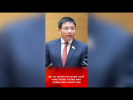Vietnam is said to be preparing a case in an international arbitration court against China’s unjustified claim in the East Sea (South China Sea- SCS). The time is now considered to ripen for a historic Vietnamese lawsuit as China increasingly threatens and harasses on disputed maritime routes and especially rising anti-China sentiment due to the worldwide deadly spread of the COVID-19 pandemic while Vietnam has gathered unprecedented strengths.
Many international sources said that within the Vietnamese government, more and more voices are demanding to sue China.
An unnamed diplomatic source told Asia Times that discussions in Hanoi about an international lawsuit are now more intense than before. In an annual meeting on the SCS held by the Vietnam Diplomatic Academy in November last year, Deputy Foreign Minister Le Hoai Trung publicly raised this issue. This is the first time in nearly 5 years, a senior official mentioned the issue. Mr. Trung said: “The UN Convention on the Law of the Sea 1982 has fully planned mechanisms to apply this measure.”
Professor Alexandre Vuving of the Daniel K Inouye Security Research Center in Honolulu, Hawai said that since last year, “there has been a lot more voices among the authorities in Hanoi calling for taking China to court.”
Derek Grossman, an analyst at the think tank RAND Corporation in Washington, said he had no information on Hanoi’s preparation to sue in international courts, but heard from government sources that the proposal was being considered serious.
Since then, Vietnam has been increasingly motivated to bring China to court when even in the context of the whole world struggling with the COVID-19 pandemic originating from China itself, China has stepped up its illegal actions in the SCS, infringing on the sovereignty of the concerned countries.
At present, Vietnam may feel that the time is ripen for a new legal move, which may draw international opinion in favor of Vietnam.

The Beijing-based China Institute of Contemporary International Relations (CICIR), a think tank under China’s Ministry of Homeland Security, the highest intelligence authority, in a recent report identified “worldwide anti-China sentiment is at its highest since the crackdown on Tiananmen Square in 1989 to date.” The global discontent with China, mainly due to Beijing’s handling of the corona virus crisis and subsequent information-distorting campaign, has never been so strong since decades.
At the same time, the Communist Party of China (CPC) is weakening in the country, due to economic growth – by which the party has been legitimated for a long time – declining in 2020, for the first time in more than forty years.
Meanwhile, the Communist Party of Vietnam has been praised at home and abroad for its unexpected ability and transparency in handling the COVID-19 pandemic. Vietnam could also benefit greatly when the US, Japan and European countries seek to be less dependent on China’s economy and move supply chains from the mainland to other countries, including Vietnam.
Besides, Hanoi can take advantage of its strong international position to conduct a lawsuit against China. This year, Vietnam is the rotating chair of ASEAN, a position that can create a more united front with neighboring Southeast Asian countries, including those that also have maritime disputes with China. Vietnam also holds a non-permanent member seat of the UN Security Council for the term of 2021-2022, a position that Vietnam can take advantage of to carry out communication activities for Vietnam’s legitimate sovereignty in the SCS and denounce Beijing’s aggression to the other Security Council members.
According to analysts, bringing the matter to international court can bring Hanoi a victory even though the victory may be symbolic.
Dr. Ha Hoang Hop said that Vietnam had no other way than legal move, because if it does not take the act, Vietnam would have no right, just “to speak.” The Philippines now is in a different position than Vietnam. Since the verdict, China did not dare to do anything to the Philippines, only threatened it outwardly. Vietnam has to sue as soon as possible and when it is completed, it must be publicly reported to the world. Vietnam should not hesitate. He predicted that after the 13th Congress, Hanoi would apply: “People have a plan to sue. The question is when. Vietnam is carefully preparing procedures, arguments, and documents. Everything is already there. Human resources were also planned. Now, just waiting for the decision of the party’s Central Committee.”
“Winning like the Philippines is more than enough because the foundation of Vietnam is exactly the same as the Philippines. Moreover, Vietnam is sometimes stronger than the Philippines because of the support of the legal experts and the governments of other countries.”
“A recent conversation between the US Secretary of State and Vietnam’s top diplomat has raised questions about legal procedures. In fact, the Americans clearly stated that if Vietnam sues, they would support in many ways and provide legal support; experts, procedures … ”
Analysts who are watching the situation believe that Hanoi can file a lawsuit – similar to the Philippines that it did before, and won China at the Permanent Court of Arbitration La Haye in July 2016. The court ruling asserted that China has „no historical right“ over the nine-dash cow’s line that Beijing uses to claim nearly 90% of the SCS. China refused to participate in the lawsuit and declared not to accept the verdict, which has no enforcement mechanism.
Dr. Hop emphasized “China learns about international law very well, so they did not participate in the litigation of the Philippines in the first place, so they considered the 2016 decision to be independent and unilateral. They considered it so they didn’t accept it. Non-recognition is legal, ie they have the right not to. But failing to recognize does not mean that China can act against it. The verdict is of eternal value.”
Professor Thayer also stated that if the Arbitral Tribunal rules in the favor of Vietnam, after Hanoi prové many controversial issues about its historical claim, “Vietnam would benefit from being promoted in on this occasion, and political pressure will be on China.”
According to Thayer, this event also provides Vietnam with „a basis to resist China’s actions, and the international community can base on that to support Vietnam.”
It is difficult to know if Vietnam is under pressure from international allies, namely the US, to sue China in an arbitration tribunal, hoping to create a second case against China’s maritime ambitions. Such a judgment, according to analysts, will give the US more solid basis for strengthening activities for freedom of navigation in the SCS.
The benefits from suing China to court are huge but the risks are not small.

In last August, Analyst Le Hong Hiep wrote that high-ranking Vietnamese officials were skeptical about bringing to arbitration because “even if Hanoi wins the case, it would not prevent China from encroaching Vietnam’s sea in the future.”
And “Even worse, because it can make China even more aggressive, destabilize Vietnam-China relations, threaten Vietnam’s economic prospects and push the country into a precarious strategic position.”
Moreover, the fact that Vietnam has brought the issue to international court may increase tensions, leading to military conflict.
Analyst Grossman said last year that if Beijing seeks conflict, Vietnam could be a priority target to start. Thereby the Chinese military will gain the necessary combat experience in the air, at sea without fear of US interference, and in a situation that can win.
Researchers state that Vietnam is in a paradoxical situation. Diplomatic and public protest efforts have not succeeded in stopping China, which recent threats have demonstrated.
But internationalization can push Vietnam and China – more broadly, the United States and China – closer to the point of armed conflict, which Hanoi knows it has no chance of winning without strong support from the outside.
Thoibao.de


























